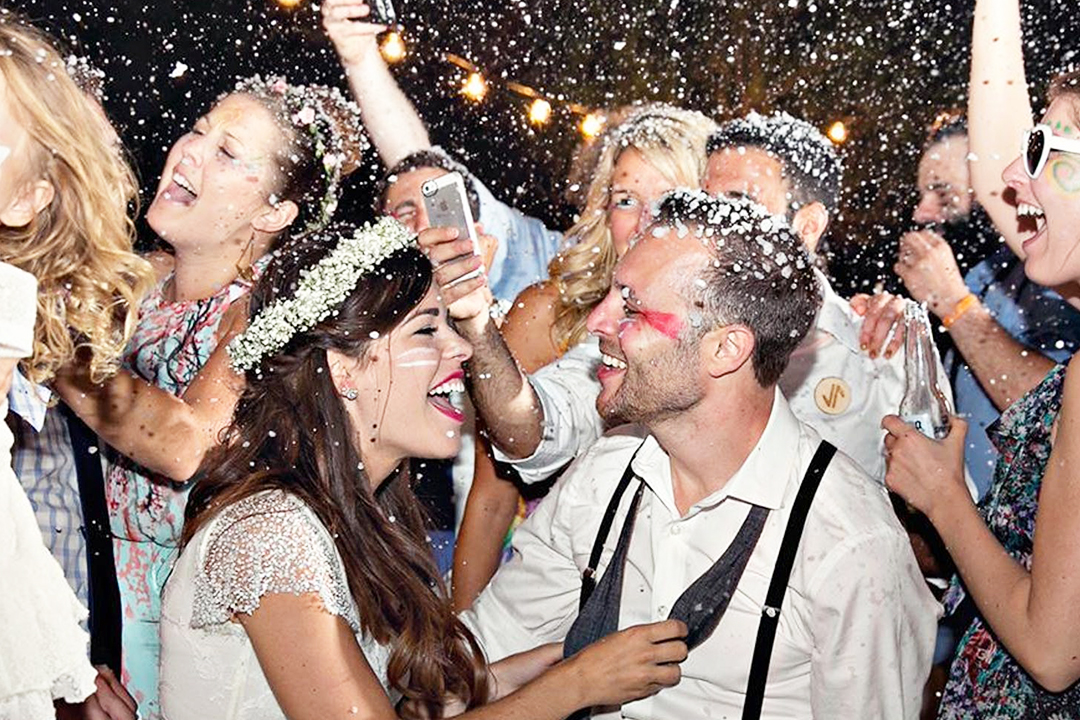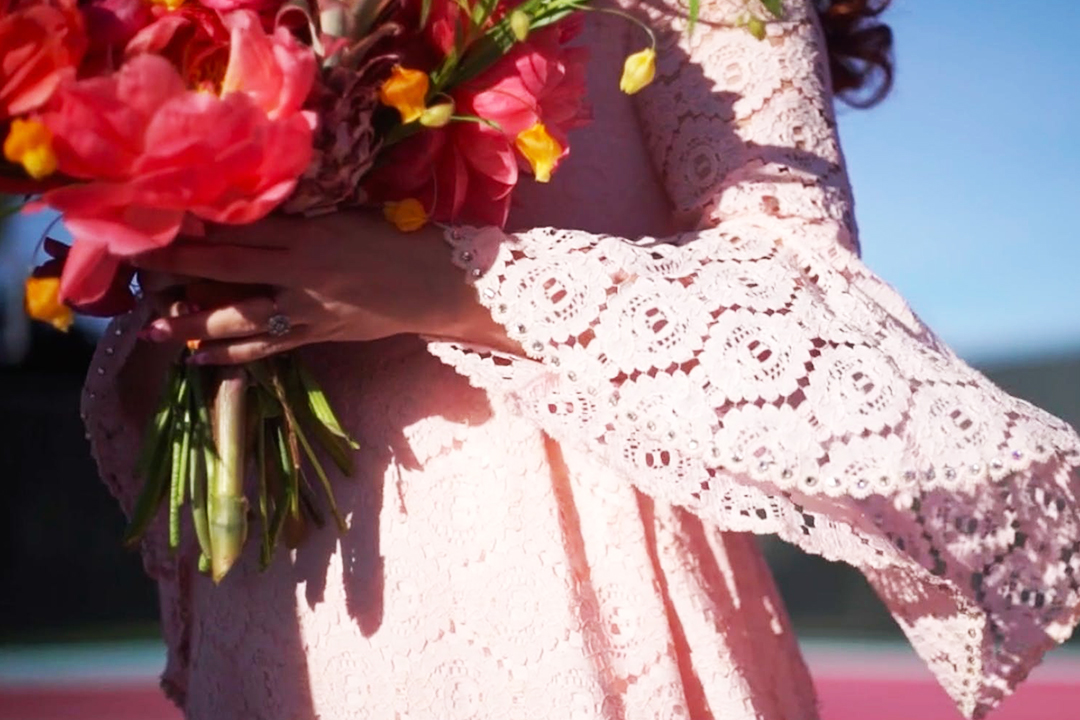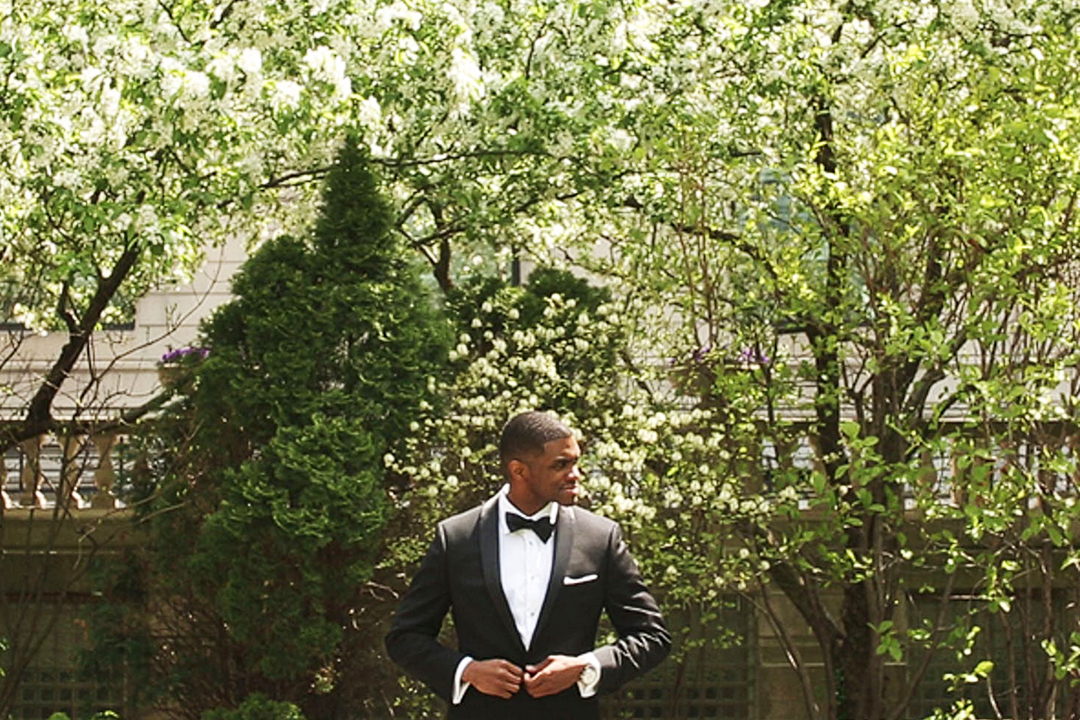- Expert advice/
- Venues & vendors/
- Photos & video/
- 10 Questions to Ask Your Wedding Videographer
- Photos & video
10 Questions to Ask Your Wedding Videographer
Read on for our list of the top 10 questions to ask a wedding videographer to determine if they're the best fit to capture your celebration.
Last updated February 5, 2024

One of the best ways to capture your wedding day is by booking a videographer to film every important moment, the priceless reactions, and the feeling of everyone who is there to celebrate with you. With so many options available, you’ll want to be armed with questions to ask a wedding videographer as you set up consultations. While his or her website, portfolio, and/or social media presence should be able to speak for itself, you’ll want to make a list of what’s most important to you and decide who the right person is to capture it.
Work together with your partner to prepare a list of to-the-point questions that will be the deciding factors to make or break the deal when meeting with potential vendors. If you need help getting started, we’ve come up with 10 of the most commonly asked wedding videographer questions that will help guide your meeting and give you a good idea of if the person will be fit to hire for your special day.
#1: How Far in Advance Should I Book?
If you already know that you want a wedding videographer, it’s best to start the search early on in your engagement. You’ll want to have time to research different vendors and ensure that they have your wedding date available. In addition to asking about availability, ask how far in advance you should book.
Due to their demand, popular videographers may book out far in advance, which means that it’ll be necessary to make a decision fairly quickly. You don’t want to get through your consultations and come to find out the person you want to work with isn’t available to shoot your wedding.
#2: How Long Have You Been Filming Weddings?
This question is important because while there may be a variety of videographers available, not all have the same, in-depth experience capturing wedding footage, specifically. You’ll want someone who has the skill and knowledge of what kinds of shots are the most important and is privy to the details of a wedding celebration.
However, if you’ve found someone who is newer to the industry, don’t count them out right away. Ask if he or she has any work for you to preview, and/or what his or her previous background entails. The videographer may have been working on his or her craft in other ways and may have only started to build up his or her own business.
#3: What Is Your Videography Style?
Like photographers, videographers have their own approaches of perfectly capturing the moments that make up a wedding. These styles range from documentary-style to cinematic to short film. Each has its own specific details and effects that make each wedding video unique.
Part of your wedding videography FAQ is to ask about his or her style, and then talk through the options of what you want for your own video. For example, documentary-style captures moments leading up to the ceremony, and possibly even after the reception, as well as everything in between. It’s filled with shifts of perspectives, reactions, narration, dialogue, and music.
Alternatively, a short film style takes the highlights of your big day and edits them together in a short four- to five-minute video, often set to music. This is usually a preference for couples who wish to share their wedding celebration online or with guests who were unable to attend in person. Consider what style you’re drawn to and match a videographer’s skill set accordingly.

#4: How Is Pricing Decided?
One of the main wedding videographer questions is how pricing works. Pricing for videographers runs the gamut, with some being hourly and others offering packaged services. Expenses start in the hundreds and quickly run into thousands of dollars, based on experience, quality, and demand for the videographer you’re interviewing. Walk through his or her pricing model and ask what’s included. Things to note are:
- How many videos will you receive?
- Will you get a digital copy and a hard copy?
- How many hours are included?
- Is there an additional fee for a second videographer?
There are various factors that could alter the amount of work your prospective videographer needs to do, which, ultimately, will alter the price. Once you’ve decided on a wedding videographer you like, make sure you read through the contract thoroughly and ask any additional questions to ensure that you know exactly what to expect.
#5: When Will the Video Be Finished?
Editing takes several days, if not weeks, depending on the videographer’s schedule and the types of wedding videography you are choosing between. The vendor should be able to give you a timeframe of when to expect the video after your wedding day. This should also be clearly stated in your contract, and a professional videographer will communicate any updates with you.
#6: Are You Familiar With the Venue/Location?
Certain wedding venues already have vendors they’d prefer to work with. This can be a plus for you because they’ll be familiar with the wedding venue and know the ideal shots to get. However, if you have the choice of your own wedding videographer, ask if he or she is familiar with your venue or location. For example, if someone has church experience only, he or she may not be as ready to shoot a wedding on the beach or another type of venue where the structure and setup is different.
Videographers that have been in the industry for several years should have a good idea of the popular venues in your city, but if you’re getting married in a more obscure place or having a destination wedding, ask about their familiarity and willingness and fees to travel.
#7: Will There Be an Assistant Available?
A wedding without any hiccups is the dream, but there are contingencies put in place when minor things are out of place or go wrong. For wedding videography, having an assistant can be an invaluable form of insurance. There will be another capable set of hands available if equipment is faulty, if there are multiple shots to get at the same time, or to simply stay on track for the timeline of the wedding.
An assistant is important to get the best angles, scout locations, and help the main videographer on the day of the wedding. Ask if an assistant is an extra fee and how many are required for your wedding specifics.
#8: What Is the Editing Process Like?
When you discuss the style of wedding video you’d like, you’ll get a better idea of how the editing process will work. If you want the footage pieced together in the style of a movie, there will be different effects and filters applied than if you opt for the traditional route.
Ask about music selections, the option of voice-overs, and other details about the video that you’d like incorporated and/or want to be avoided. Once the videographer is in the editing phase, it’s unlikely that he or she will have back-and-forth communication about the process. Get your requests in ahead of time and confirm that the professional is able to grant those to you after the filming is through.
#9: Do You Provide Lighting Equipment?
Depending on the time of day that your wedding takes place, you’ll have natural light to work with, in addition to the lighting that’s part of your ceremony and reception. Ask if this is adequate for your prospective videographer, and, if not, inquire if he or she provides lighting equipment for certain shots.
Your potential videographer may have a camera that has lighting attached already or have ideas on the time of day to shoot certain events to ensure the best lighting quality available. Confirm if this is an extra expense or equipment you need to provide as a backup. As a bonus, it’s nice when your videographer and photographer can collaborate to get the shots and format of what your wedding will look like from each perspective.
#10: How Much Input Do We Have?
It’s best to leave the video magic to the pros, but you’ll also want to work with a videographer who is open to your ideas and has a strong grasp of the aesthetic you’re trying to achieve. While they may all follow a similar technical format, discuss the feeling you want your final video to have, the important moments to capture, and the way you want to be filmed.
Do you want mostly up-close shots, interactions before the wedding ceremony, and video of details of the wedding on their own, such as the cake, bridal bouquets, and wedding dress? All of this is important to review with your videographer. Though he or she has the skill and experience to produce a quality video that has a crisp picture and optimal sound, communicating your desires ahead of time will help to set the right expectations.
A wedding video is a cherished keepsake of your nuptials and one you’ll want to watch over and over. To ensure you find the perfect fit for your style as a couple and the way you want your wedding to look, these are the questions to ask a wedding videographer. A good videographer will be more than happy to answer all the questions you have to make sure your day is captured beautifully.

- Expert advice/
- Venues & vendors/
- Photos & video/
- 10 Questions to Ask Your Wedding Videographer
Find even more wedding ideas, inspo, tips, and tricks
We’ve got wedding planning advice on everything from save the dates to wedding cakes.
